‘Local SEO’ is one of the most widely used phrases when people speak about handling the online presence of any local business. The focus on local SEO has increased exponentially in the past few years, mostly owing to one significant shift in user search behaviour – the usage of “near me” searches:
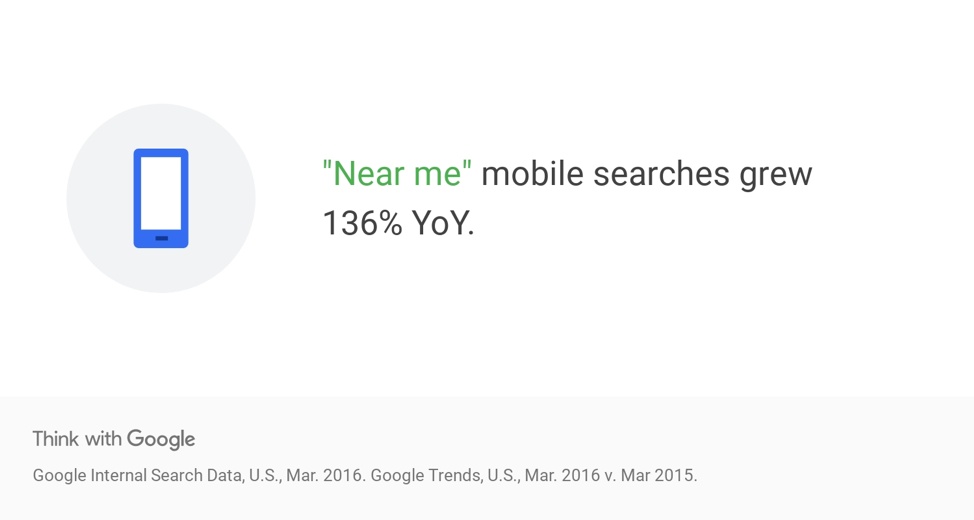
We’ll get to ‘near me’ searches in a bit. Before we do, in case you’re not yet familiar with what local SEO is, here’s a brief introduction.
Local SEO is an important aspect of a much larger subject, Search Engine Optimisation (SEO). SEO is the practice of optimising every digital touchpoint that a business, organisation, or service has online. This is done in order to facilitate quicker and better crawling, indexing, and ranking of your website(s) or online listings by search engines like Google.
There are a lot of factors that are taken into consideration when search engines rank a business or website in organic searches. SEO aims to optimise as many of these as possible for said business or website, to ensure that it ranks on the top of search results, and is shown to the right audience at the right time.
However, local SEO has a more focused goal. It is aimed at optimising a businesses online presence for searches with local intent. Here’s an example that will help understand this better.
When someone searches for something generic on Google, let’s say ‘continental food’, this is what the results look like:
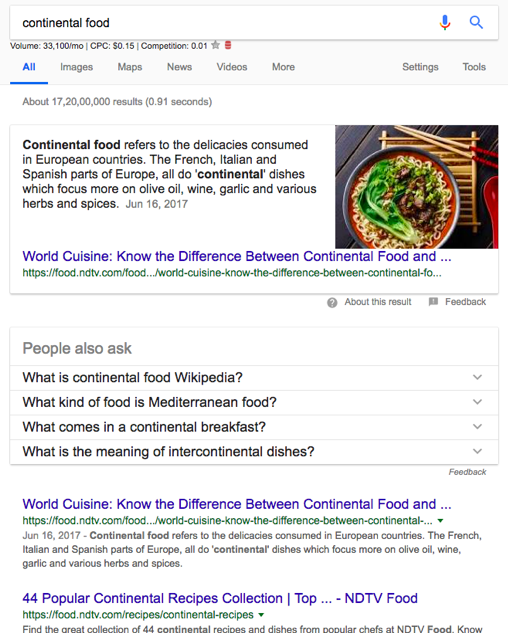
It’s quite evident that the results mostly comprise of links to food blogs, recipes and other informational articles. However, when the same search query is suffixed with the phrase ‘near me’, the results are drastically different, as shown below:
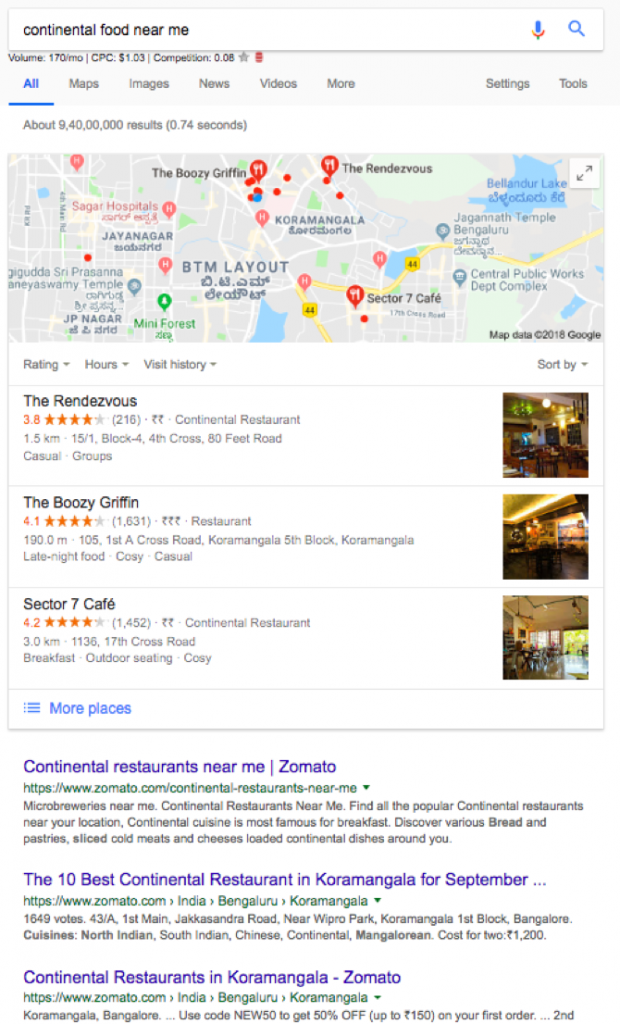
Now the results include a local pack with the nearest restaurants that serve continental food, followed by business listings on third party sites/online directories. Why is that so?
This is because Google understands that the search has been made with local intent, and changes the results accordingly. Local SEO, as mentioned before, aims to optimise various aspects of a businesses online presence to rank higher and increase visibility in such searches.
The first step in optimising a businesses local SEO is to perform an initial local SEO audit, and understand where it stands when it comes to local search. This will also highlight the areas that need to be improved, and what can be done to improve it.
Performing a local SEO audit is not as complicated as it might sound. An initial audit of a businesses local SEO hardly needs any expertise, just a basic understanding of the subject. Since that has already been covered, it’s time to take a look at how people can do a local SEO audit for a business on their own.
1. Business Listings
The first step in any local SEO audit should always be to make sure that the business is listed on all the major online directories. Businesses should not be confined to being listed on Google alone, but also other sites such as Yelp, TripAdvisor, Foursquare, etc. Here’s why.
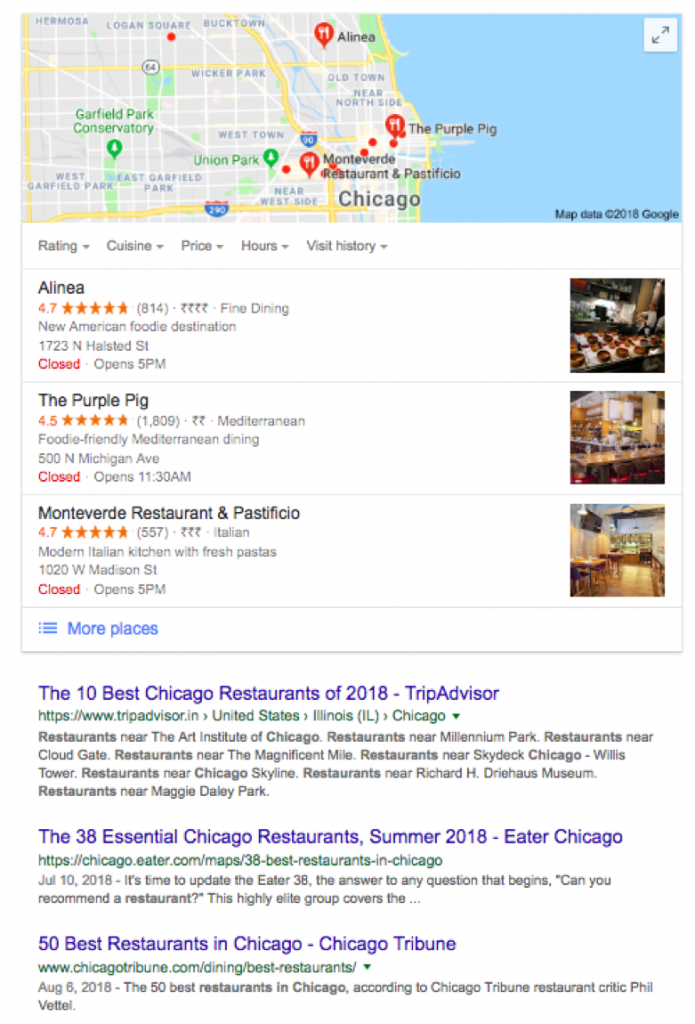
In the above search results for ‘restaurants in Chicago’, one can see that the results following the local pack are actually links to local business listings on third party sites, and not the business websites themselves.
This drives the point that in order to improve a businesses local SEO, it must be listed in major online directories and industry-specific niche directories.
2. On Page Local SEO
On page SEO entails including local information about a business in their website (title tags, meta tags, header, footer, etc.). This information could be the businesses address, city, state, contact information, etc. A quick look at the search results for the phrase ‘carpet cleaners in Colorado’ clearly shows why.
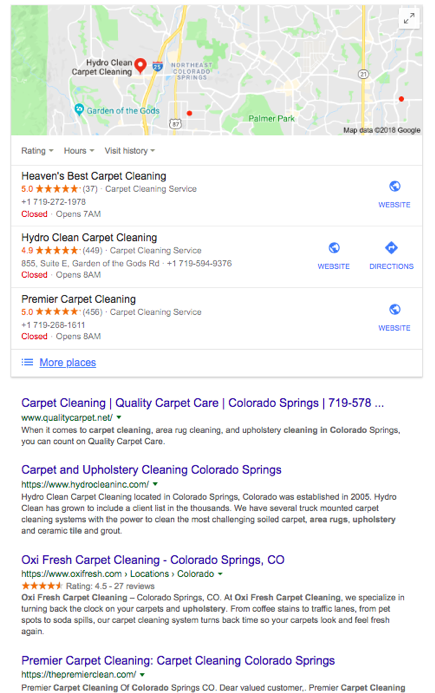
Unlike the search results seen before, this page does not have directory listings below the local pack. Instead, it has individual business websites listed. Now let’s take a look at the title tags for these websites.
- <title>Carpet Cleaning | Quality Carpet Care | Colorado Springs | 719-578-5300</title>
- <title>Carpet and Upholstery Cleaning Colorado Springs</title>
- <title>Oxi Fresh Carpet Cleaning – Colorado Springs, CO</title>
From the above title tags, it is quite evident that including a businesses location info in the title tag helps them rank for local searches. The same applies for meta tags, headers, and footers as well.
3. Incorporating Local SEO in Website Content
A study of the local ranking factors shows that including keywords that a business is targeting in the website content plays a significant role in determining its local ranking. For example, if a HVAC business in New York wants to rank for industry-related local search, writing blogs and other articles about the local HVAC industry and its developments and trends, with targeted keywords, will greatly help the cause. One can go about this by following these three steps:
- Conducting detailed research, gathering data and information about the present industry scenario.
- Use the data to publish content pieces that are informative and engaging.
- Ensure the every content piece is focused on a keyword, and that it has a keyword density of 1% – 2%, which would be the optimal amount.
4. Social Media Profiles
Having a business profile on social media sites such as Facebook, Instagram, Snapchat, etc. also contributes to local rankings and discovery. According to this survey, 76% of consumers buy products discovered on social media. Besides helping build brand presence and promote/sell products, social media also paves the way for better customer engagement. This is evidenced by the fact that 68% of users will go straight to a businesses social media profile to rate, review, and check out said business.
Therefore, a local SEO audit for any business should also include ensuring an active presence on social media channels, and making sure to respond to queries and reviews as soon as possible.
These 4 steps are all one needs to follow when conducting a basic local SEO audit for their business. Once this is done, further steps can be taken to do a much more in-depth audit, with the help of a checklist like this one.
If you’re looking for some more useful SEO tips and strategies, check out these other Marketing.com.au articles:
- 5 Simple Tips to Optimise Your WordPress Website for SEO and Increase Conversions
- Seven Key eCommerce SEO Tactics and Tools You Should Be Using
- 5 Must See Strategies Guaranteed to Boost Your Site’s Traffic
Antony Melwin
Latest posts by Antony Melwin (see all)
- How to Perform a Local SEO Audit All by Yourself - November 7, 2018








